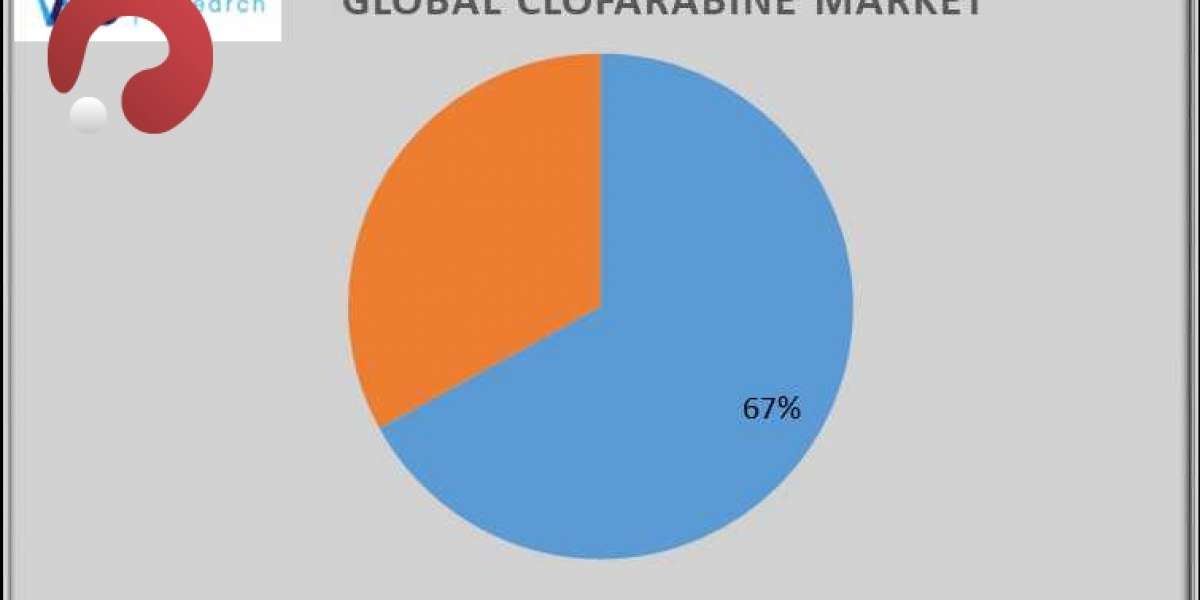Clofarabine is a purine nucleoside analog used primarily in the treatment of acute lymphoblastic leukemia (ALL) in pediatric patients. It is an essential chemotherapeutic drug, especially for patients who are refractory or have relapsed after other treatments. The Clofarabine market revolves around its use in the pharmaceutical and oncology sectors, with increasing demand due to its efficacy in treating specific types of cancer.
The market for clofarabine is expected to grow at a compound annual growth rate (CAGR) of x% between 2024 and 2034, when an average growth pattern is expected to take the market to USD xx million. According to estimates, the market will be worth USD xx million by 2024.
The global clofarabine market is being driven by the increased incidence of leukemia, especially in cases of ALL and AML, which has created a need for effective treatments like clofarabine. Government financing, developments in cancer treatment, and its status as an orphan drug all contribute to its development. The rising number of children and the expense of healthcare are driving up demand. Innovations in medicine delivery technology improve treatment outcomes. Growing awareness of leukemia symptoms and a robust oncology pipeline are contributing factors to the market's expansion. Collectively, these factors propel clofarabine's demand and solidify its position as an essential component of leukemia treatment regimens worldwide.
Click the link to get a sample copy of the report: https://wemarketresearch.com/reports/request-free-sample-pdf/clofarabine-market/1488
Clofarabine Market Drivers
- Increasing Cancer Incidence: The rising incidence of cancers, particularly blood cancers like acute lymphoblastic leukemia (ALL) and acute myeloid leukemia (AML), is a key driver of the clofarabine market. The growing awareness about early diagnosis and targeted treatment has increased the demand for effective chemotherapy drugs.
- Advancements in Cancer Treatment: As research in oncology advances, there is a continuous need for effective chemotherapeutic agents. Clofarabine has proven to be a successful treatment option, and ongoing clinical trials aim to explore its use in combination therapies and other cancer types.
- Growing Pediatric Oncology Treatment: Clofarabine’s FDA approval for pediatric ALL positions it as a critical drug in pediatric oncology, a segment that is witnessing significant advancements in personalized medicine and targeted treatments.
- Increasing Research and Development (RD): Pharmaceutical companies are investing in RD to expand the applications of clofarabine. With ongoing trials and innovations, the scope of clofarabine in combination therapies is expanding, providing further growth opportunities for the market.
Clofarabine Market Challenges
- Side Effects and Drug Resistance: Despite its efficacy, clofarabine is associated with certain side effects, including bone marrow suppression, hepatotoxicity, and infection risks. Moreover, resistance to chemotherapeutic drugs is a significant concern, potentially limiting its long-term efficacy.
- Cost of Treatment: Clofarabine is a high-cost treatment, which can be a challenge for healthcare systems and patients in regions with limited healthcare reimbursement or low-income demographics.
Clofarabine Market Regional Insights
- North America: The U.S. holds a significant share of the clofarabine market due to advanced healthcare infrastructure, robust research, and high adoption of cancer therapies. The presence of leading pharmaceutical companies and support from government organizations for cancer treatment fuels market growth in this region.
- Europe: Europe also sees a strong demand for clofarabine due to rising cancer cases and improvements in pediatric cancer treatments. Countries such as Germany, France, and the U.K. are investing heavily in cancer research and patient care.
- Asia-Pacific: This region is expected to witness the fastest growth in the clofarabine market due to improving healthcare infrastructure, rising healthcare expenditure, and increasing cancer awareness in emerging economies like China and India. Furthermore, pharmaceutical companies are increasingly looking to expand their presence in this region to capture untapped market potential.
Top Companies in the Clofarabine Market
Sanofi: A leading player in the clofarabine market, known for its robust product pipeline and significant market presence.
Genzyme Corporation: A subsidiary of Sanofi, Genzyme focuses on developing treatments for rare diseases, including leukemia.
Hospira, Inc. (Pfizer): A major player offering a range of oncology drugs, including clofarabine.
Global Clofarabine Market Segments
By Indication:
- Pediatric Acute Lymphoblastic Leukemia (ALL)
- Acute Myeloid Leukemia (AML)
- Others (including off-label uses)
By End-User:
- Hospitals
- Cancer Treatment Centers
- Research Institutes
- Others
Conclusion
As cancer treatment continues to evolve, the role of chemotherapeutic agents like clofarabine remains crucial in combating certain blood cancers. Despite the challenges of side effects and cost, advancements in drug delivery systems and combination therapies are likely to make this market a critical segment of the broader oncology drug landscape. The rising incidence of leukemia and ongoing RD efforts suggest a positive future for the Clofarabine market globally.














